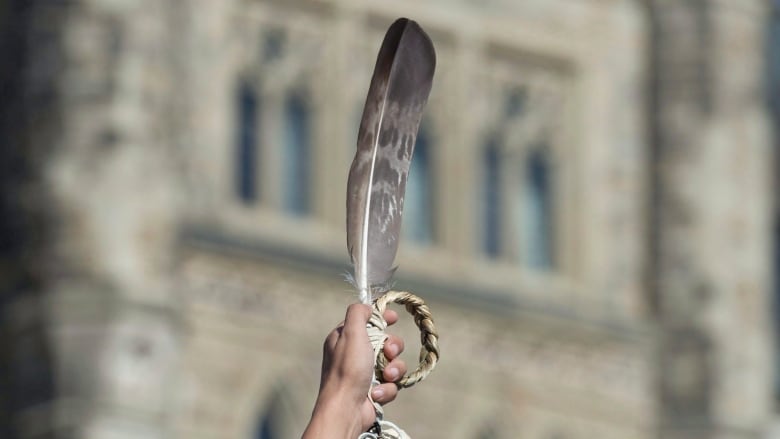How the legacy of the Royal Commission on Aboriginal Peoples lives on, 25 years later
While its recommendations were largely ignored, the sweeping report had profound impact in legal community

On Nov. 22, 1996, the day after the Royal Commission on Aboriginal Peoples (RCAP) was released, Paul Chartrand picked up five major newspapers.
The Métis lawyer was one of seven commissioners on the sweeping 4,000-page report, which detailed past atrocities inflicted on Indigenous people, how that affected the present and included 440 comprehensive recommendations to help shape an equitable future in Canada.
But only one thing seemed to matter — at least according to the media reports Chartrand read.
"Every one of them … focused on the same thing: 'What will it cost?'" he recalled.
Chartrand remembers the federal government, too, looking past the detailed history of colonialism and the sophisticated analysis of the contemporary Crown-Indigenous relationship presented by the report.
"None of this stuff matters. How much is it going to cost so we have peace?" he said, describing the sentiment at the time.
Roadmap for change
Born amid an era of high tension, the RCAP was established in 1991 in the aftermath of the 78-day standoff known as the Oka Crisis, or the Kanesatake Resistance. The commission's work was still in progress as other conflicts arose, including those at Gustafsen Lake in B.C. and Ipperwash in Ontario in 1995.

Over four years, the commission travelled to 96 communities and held 178 days of public hearings to produce a comprehensive five-volume report that essentially outlined a 20-year roadmap for bettering the lives of Indigenous people in Canada.
And the cost of peace — as Chartrand says the government viewed it — was a recommendation for a $30-billion investment in Indigenous communities over a 20-year span.
The commissioners argued investing this money immediately to eliminate gaps in areas like education, health care, nation-building, justice and child care would actually save the federal government money 20 years down the road.
In other words, sovereign, healthy communities would cost a whole lot less due to the initial, upfront investment.
But that $30-billion figure, along with the constitutional changes needed to achieve some of the reforms, led the government to reject the funding's implementation within an hour of the report being tabled.
Ron Irwin, the Indian Affairs minister at the time, said: "If you come at it and say, 'If you put all these billions in, things will be better, we'll all get to heaven,' it doesn't work."

It was also around this time that the federal government would place a two-per-cent funding cap on Indigenous services, which would stay in place for almost two decades.
Many people, including Chartrand, say in terms of the implementation of the recommendations, the report has largely collected dust.
"I'm past the point of being surprised by those sorts of things," said Chartrand, now in his late 70s.
"The status quo is difficult to move. Things are the way they are for reasons — and very powerful interests have vested interests in the status quo. So it's very, very difficult to initiate change."
Legal implications
But others believe the RCAP has done much more than collect dust, particularly as it's been a resource in many groundbreaking legal cases that have asserted Indigenous rights in Canada.
"People sometimes sort of — not denigrate it, but sort of say it just gathered dust. But it did more than that," said Mi'kmaw lawyer Naiomi Metallic.
"It laid the groundwork for what came next. So if it's not, on its own, a panacea that solved all the problems, it is bringing us in the right direction."

If you name an important case asserting Indigenous rights in Canada, the RCAP is likely cited.
It's cited extensively in R v. Gladue, a landmark ruling that advises lower courts to consider an Indigenous person's background before sentencing.
It's also cited in R v. Powley, a ruling that established case law on Métis rights surrounding identity.
It's also important in Delgamuukw v. British Columbia, a ruling that, among other land rights, established a duty to consider oral histories from Indigenous communities in future rulings.
So while the RCAP report didn't result in the sweeping constitutional changes its commissioners had hoped for, its weight as a royal commission — essentially functioning as a documented history of colonialism and its impacts on Indigenous people — has been felt in the legal community.
And in turn, it's been felt by the communities it was meant to affect.
The RCAP also laid the groundwork for future reports, said Metallic, helping inform efforts like the Truth and Reconciliation Commission (TRC), making that work more impactful.
"The TRC hasn't been fully implemented, but it has had an impact. It has changed the public consciousness in a way that RCAP did not. But there's a through-line between them," she said.
As for whether the RCAP itself has value today, Metallic said while some things may need to be rethought in the contemporary context, the report still offers tremendous value in guiding how to support Indigenous communities.
And according to Chartrand, the report's recommendations still need to happen for there to be any equity for Indigenous people in Canada.
"Constitutional change is required. It is a necessity if Canada is going to have a just and defensible relationship with Indigenous people," he said. "That's my own belief in 2021."

